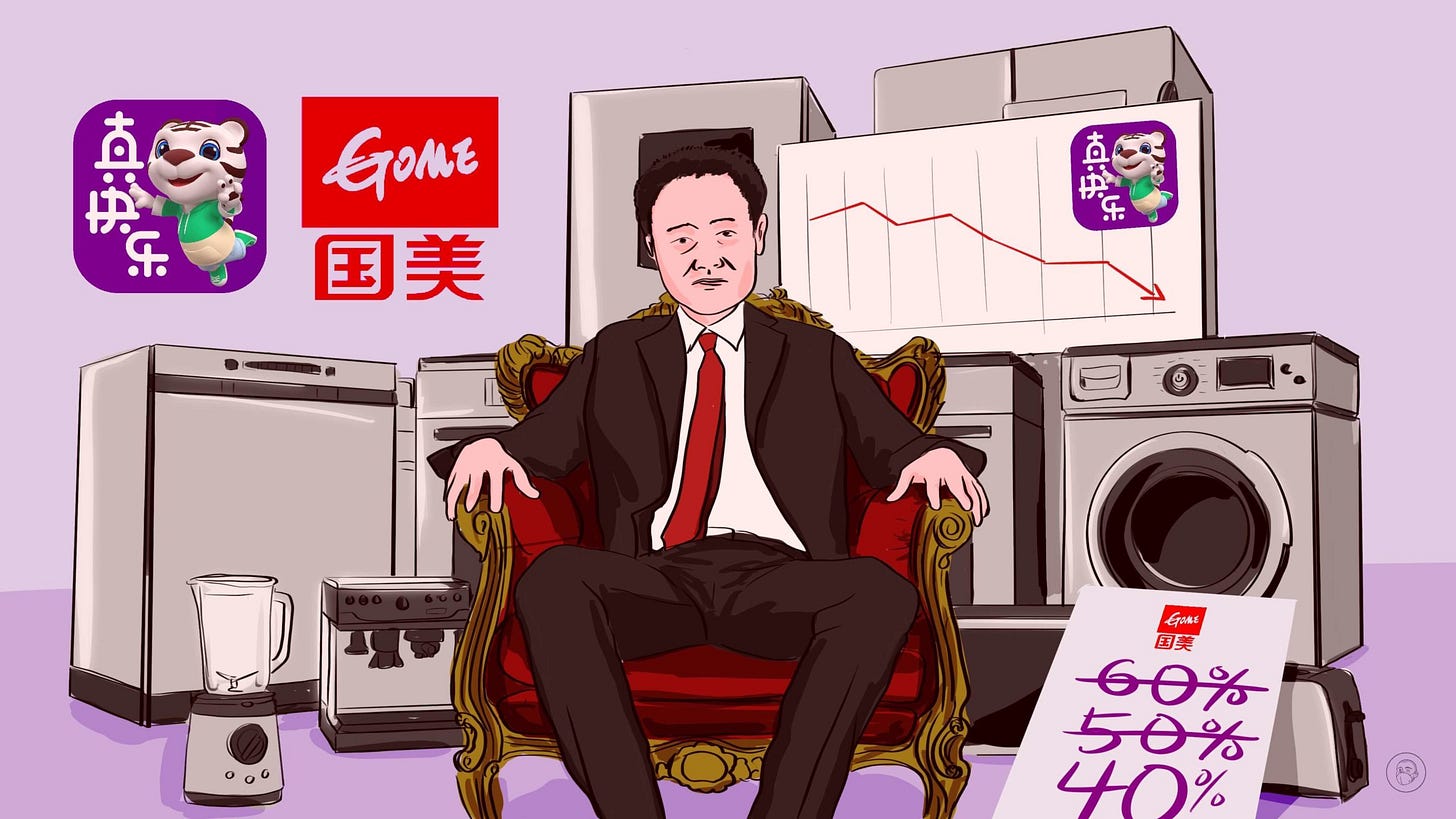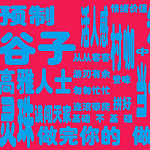Welcome to RealTime Mandarin—a multimedia resource to immerse you in the latest Chinese language trends, inspire you to practice and improve your Mandarin every week, and empower you to communicate with confidence.
Subscribe now to get the next issue straight to your inbox!
Gome (国美零售 guó měi líng shòu) was once one of China’s largest electrical appliance retailers.
Founded in 1987 by Huáng Guāngyù 黄光裕, Gome became one of the dominant players in China's fast-growing home appliances market alongside the likes of Suning (苏宁易购 sū níng yì gòu) and Galanz (格兰仕 gé lán shì).
Having done a ten-year stint in jail for corruption and insider trading, Huang Guangyu took back the reins of the company on his release in February, 2021, making a bold promise:
In 18 months, we will take Gome, with its falling sales in recent years, back to its former market-leading position.
要用18个月时间将最近几年销售成绩呈下滑趋势的国美恢复到原有的市场地位
But since then, Gome has fallen into turmoil:
Gome in the past was always the ‘big brother’ of the home appliance market. Today, it has lost a market value of HK$ 80.6 billion. At the same time its business development has not gone well. Teams working on new apps, Home Designer and Zhen Kuaile, are reported to have had their wages cut or stopped. Negative reports surround the business including: owing loans, lay-offs and wage cuts, and loss of business.
过去,一直作为电器零售大哥存在的国美,如今,市值损失806亿港元。与此同时,业务发展亦不顺利,打扮家、真快乐先后被爆出停发工资。萦绕在国美周遭的,是“拖欠货款、裁员降薪、业绩连亏”等负面声音
Can Gome survive, or is it gone for good?
Analysts in China are in two camps:
One is that from a business point of view, Gome’s offline business may bounce back in the future; the other is that Gome has already missed its best opportunity, and even Huang Guangyu cannot bring it back, and perhaps Gome will follow in the footsteps of Suning.
一种投资人认为,从业务逻辑看,国美线下的能力,未来仍有可能反弹;另一种看来,国美已经错过了最好的时代,即便是黄光裕也难力挽狂澜,或许国美将走上苏宁的老路。
So this week we explore the discussions of how one of China’s most successful companies has not kept up with the times.
Favourite Five
1. 倒爷 dǎo yé
re-sellers
这一时期,一大批“倒爷”出现,他们从深圳、广州等开放的口岸拿货后,火车转送至内地售卖 - At that time, there were many people re-selling goods. They would buy them from Shenzhen, Guangzhou and other places that were opening up, and then take the train further inland and sell them.
Note: from the phrase 倒卖 dǎo mài ‘re-selling’ in Chinese.
2. 媲美 pì měi
rival or be compared to
线下渠道的经营质量和经营能力,已经无法和线上媲美 - There is no way that offline sales channels can compare to online in terms of operational quality and ability.
Note: this phrase was in every article I read about Gome and its failure to go online. It’s a good one to learn. 媲 pì is a great character also which means ‘to match’ or ‘be a match for’.
3. 拼命三郎 pīn mìng sān láng
‘dare-devil third brother’; a workaholic
即使黄光裕依旧是“拼命三郎”,但国美短时间内难追“失落的十年” - Although Huang Guangyu is a workaholic, Gome cannot get that lost decade back in the short-term.
Note: 拼命三郎 pīnmìng sānláng - ‘daredevil third brother’, is a character in the classic 16th century novel, Water Margin 水浒传 shuǐ hǔ zhuàn. Now a popular idiom, it’s used to describe fearless or hardworking men. The female equivalent is 拼命三娘 pīn mìng sān niáng - workaholic woman - which is a modern variation on the male equivalent. We discussed that in 2 April newsletter this year.
4. 新官上任三把火 xīn guān shàngrèn sān bǎ huǒ
a new official sets three fires; a new broom sweeps clean
回归之后,黄光裕烧了“三把火”。2021年,国美相继推出“真快乐APP”、“折上折APP”和“打扮家APP” - After returning to the company, Huang Guangyu focussed on three top priorities, with Gome releasing three apps in 2021.
Note: from the Romance of the Three Kingdoms (三国演义 sān guó yǎn yì). When Zhū Gěliàng 诸葛亮 became Liú Bèi’s 刘备 general in AD 202, he organised three fire attacks in quick succession against Cáo Cāo’s 曹操 forces. The first was the Battle Bowang Slope (博望坡 bó wàng pō) which took out over 10,000 troops; the second was at Xinye (新野 xīnyě), and the third was the Battle of Red Cliff (赤壁 chì bì) which was China’s largest naval battle, seeing Cao Cao’s armada burnt and obliterated, spelling the beginning of the end of the Han Dynasty. The phrase ‘burn three fires’ is now used to describe the three top priorities of a new leader taking on his or her role.
5. 贪多嚼不烂 tān duō jiáo bù làn
bite off too much to chew; take on too much
归根究底,贪多嚼不烂,与其进行多元化布局,不如聚焦主业 - In conclusion, the main problem was the company tried to do too much. It would have been better to focus on their main business rather than trying to diversify.
Note: first appeared in the short story Slapping the Table in Amazement Part II (二刻拍案惊奇 èr kè pāi'àn jīngqí) by Ming Dynasty writer Líng Méngchū 凌蒙初.
Consuming the Conversation

Useful words
江湖 jiāng hú
‘rivers and lakes’, business world
如今的国美在电商江湖,早已风光不在 - Nowadays, Gome has lost its appeal in the home electronics sector.
Note: Used to refer to the ‘underworld’ but it now more of a neutral word and describes the business world in a certain sector. Jiāng hú first appeared in in the works of Zhuangzi 庄子, the metaphor meaning ‘areas outside of state control’ (see classics section below).
萦绕 yíng rào
linger, hover, surround
萦绕在国美周遭的,是“拖欠货款、裁员降薪、业绩连亏”等负面声音 - There are a number of negative news stories circulating around Gome: delaying loan repayments, lay offs and wage cuts, and continued losses of its business.
风光 fēng guāng
scenery; to be proud about
拥有一台电视机,是一件非常风光的事情 - To own a TV was something to show-off.
窘境 jiǒng jìng
a difficult situation
仅为当时陷入窘境的苏宁易购618期间的790万日活的1/4 - It was only a quarter of Suning’s 7.9 million daily active users during the 618 shopping festival.
缠身 chán shēn
be held up or burdened with something
国美被多重负面缠身,是战术错误,还是战略问题?- Gome has been entangled in many problems. Is this because of its tactical error or is it a problem with the strategy?
祭出 jì chū
to do something that is not seen every day
黄光裕快速祭出了几个大动作 - Huang Guangyu quickly took some big actions.
Note: normally mean sacrifice, here it emphasises how Huang’s actions were punchy.
Three character phrases
托关系 tuō guān xi
use a relationship to achieve a goal; pull strings














